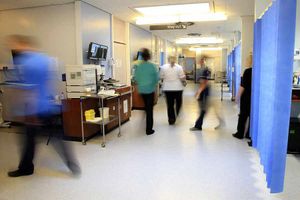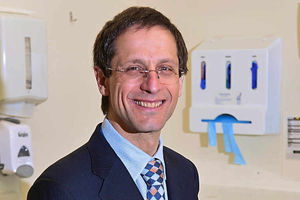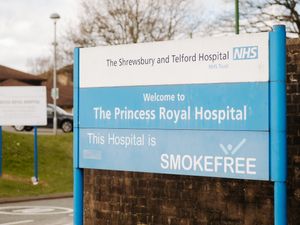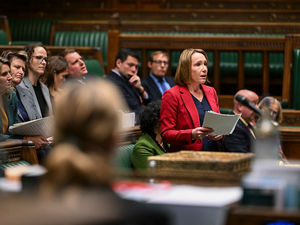Changes promised after patient's death at Telford hospital
Lessons will be learned after a coroner ruled hospital procedures probably contributed to the death of an elderly patient at the PRH in Telford.

Dr Ian Tanswell, clinical governance lead for unscheduled care at the Shrewsbury and Telford Hospital NHS Trust, told an inquest that new practices were now in place at Princess Royal Hospital following the death of 80-year-old Cynthia Lancaster.
This includes extra training for staff, an overhaul of systems used to detect a patient's condition, extra meetings with family members, improvement plans for staff nurses and changes in procedure for trainee doctors and on-call staff.
Case study one:
Hospital staff in Telford missed two opportunities to prolong the life of Colin John Leese who died of a heart attack after complaining of a pain in his arm, a coroner ruled.
The 67-year-old, of Oakengates, Telford, died at the Princess Royal Hospital in May 2013.
Two days before his death he had been in the A&E department complaining of a pain in his arm, often a symptom of a heart attack, but was discharged after being examined by doctors.
An inquest recorded a verdict of accidental death. But coroner John Ellery said Mr Leese's life could have been prolonged if a blood test had been carried out during his visit to A&E and if he had been transferred to a specialist centre when his condition began to deteriorate when he returned to the hospital the following day.
The next day, when Mr Leese returned to the hospital, he was put forward for referral to a tertiary centre at New Cross Hospital, in Wolverhampton, for treatment. But it was decided that no acute intervention was needed so he was kept at the Princess Royal for treatment, where he died on May 18.
Dr Ian Tanswell, clinical governance lead for unscheduled care at The Shrewsbury and Telford Hospital NHS Trust, said new practices were now in place.
He said: "When patients present, like Mr Leese, with no pain in the chest but pain in arm, jaw or chest, they get an ECG."
Case study two:
Coroner John Ellery ordered surgeons at Shropshire's two main hospitals to review the way they carry out hip operations following the death of a pensioner whose surgery took twice as long as it should have.
Joan Durber spent four hours under the knife at Telford's Princess Royal Hospital after falling at home and breaking her hip.
But an inquest in Wellington heard the operation should have only taken two hours and coroner Mr John Ellery ruled it "undoubtedly" played a part in the 77-year-old's death from bowel problems a few weeks later, in July last year.
Consultant orthopaedic surgeon Mr Ronald Dodenhoff said it was standard practice to pour "two mixes" of cement into the new joint. But on this occasion surgeon Mr Omar Salah only put the equivalent of one mix in. Mr Dodenhoff told the inquest he had to intervene and effectively start the operation again.
Mr Salah, giving evidence at an inquest in December, said: "I asked the scrub nurse for the standard amount and I didn't check how much was in the mix."
The inquest heard Mrs Durber, from Market Drayton, was deemed fit to be transferred to Whitchurch Community Hospital four days after the operation. But she was re-admitted to the Princess Royal on June 29 and taken by emergency transfer to the Royal Shrewsbury Hospital on June 30, where she spent 10 days in intensive care before dying on July 10.
Case study three:
Sally Ann Kirkpatrick died in hospital after medication was mistakenly injected into an artery instead of a vein, an inquest heard.
She was administered drugs by an anaesthetist at the Royal Shrewsbury Hospital after she suffered septic shock.
The health trust, which runs the RSH and Telford's Princess Royal Hospital, has introduced new procedures in the wake of Mrs Kirkpatrick's death in November last year.
Mrs Kirkpatrick, 50, from Bishop's Castle, had suffered two episodes of severe septic shock close together before anaesthetist Dr Allinson Ayodele Abayomi administered medication to help treat her, the inquest at Shirehall in Shrewsbury was told.
Dr Louise Sykes, consultant in anaesthesia and intensive care at the Royal Shrewsbury Hospital, apologised to Mrs Kirkpatrick's family, saying she was "so sorry" for what had happened.
Dr Sykes said that out of 1,000 cannulation procedures to insert lines into a vein, this was "the only fatal one I know of at the trust".
"To prevent it happening again to anyone else we have introduced new procedures," she added.
Dr Abayomi said he had performed the procedure more than 450 times before.
Mr Ellery recorded a conclusion of complication of a medical procedure at the hearing earlier this month.
The inquest into Mrs Lancaster's death is the latest inquest that has led to a review of hospital procedures in recent months.
Others include:
May 2013: A review was ordered after opportunities were missed to prolong the life of a man who died of a heart attack after complaining of a pain in his arm.
July 2014: New procedures were brought in after a woman died in hospital after medication was mistakenly injected into an artery instead of a vein.
November 2014: Coroner John Ellery ordered surgeons to review the way they carry out hip operations following the death of a pensioner whose surgery took twice as long as it should have.
Mrs Lancaster, of Newport, was admitted to hospital by her GP in September last year with abdominal pains.
The grandmother died due to a small bowel obstruction, the inquest heard.
But Mrs Lancaster was diagnosed and treated for constipation and acute kidney injury, despite an X-ray being carried out.
The inquest went on to hear that nursing care following this misdiagnosis was "basic" and staff failed to call for a medical review, despite her "deteriorating condition" on the morning before her death.
Although it was agreed by coroner John Ellery that even if the intestinal blockage had been properly picked up, Mrs Lancaster would not have been fit for surgery, he said he was concerned with what "non-surgical treatment was available".
He said: "This treatment was sub-optimal. What difference did that sub-optimal treatment make? It cannot be said with certainty. This must be put in the context of a lady of 80 years old with significant medical conditions. I can't say at what point it would have made a difference. Perhaps Mrs Lancaster would have died anyway. I don't know. Dr Ian Tanswell said that the lack of optimal care did not cause her death but probably contributed to it and I accept that conclusion."
Speaking at the inquest at Shirehall on Tuesday, Dr Tanswell said that from now on when a trainee doctor was involved in a complaint or serious incident the patient safety team would be notified.
He said improvement plans for staff nurses would "target knowledge gaps" in recognition of a deteriorating patient and ward four had been put on a "quality improvement framework".
"If the ward accepts a patient from the Acute Medical Unit, the nurse will now go down to have a handover," Dr Tanswell, who called for the inquest, added. He now has 28 days to submit a further report on how on-call staff should have the equipment to see X-rays at home and how they should attend the hospital if called by a trainee doctor.
Mr Ellery said he would consider this supplement report before deciding whether he would send the trust further directions.
He added that any further questions about the case were for outside the inquest. Mrs Lancaster is survived by her husband Maurice, children Jane, Robert, Katie, Shirley and William and eight grandchildren.
Mr Mark Cheetham, Scheduled Care Group Medical Director at the Shrewsbury and Telford Hospital NHS Trust, said: "I would like to offer my sympathies to the family of Cynthia Lancaster. The care of our patients is at the heart of everything we do.
"We centralised acute emergency surgery on one site to ensure we provide appropriate, safe levels of care. There are arrangements in place to ensure a surgeon is always available at the Princess Royal Hospital when required but, by preference, we transfer stable patients to the Royal Shrewsbury Hospital for surgery.
"Since September 2012, this has significantly reduced death rates for people needing emergency surgery.
"It is for this reason that I, and clinical colleagues across the county, believe a single emergency centre would offer the best care for all of our patients."
Medical director insists lessons are learned

Dr Edwin Borman, medical director at The Shrewsbury and Telford Hospital NHS Trust (SaTH), assured members of the public that the trust does all it can to learn from tragic events
He said the Shrewsbury and Telford Hospital NHS Trust carries out reviews into deaths and also serious incidents so changes to procedures can be adopted. It also regularly reviews clinical processes.
Dr Borman said: "The Coroner's Court provides a legally defined way of assuring the public that any death, including those in hospital, has been examined and, where appropriate, that lessons are learned and applied.
"All hospitals have processes where specialised patient safety teams will review not only patients' deaths but also serious incidents, so that we can put into practice the lessons that we have identified ourselves.
"The combination of these systems – coroner and hospital – can assure the public that we do all that we can to learn from tragic events, in order to prevent anything similar from happening.
"At SaTH we go beyond that by regularly reviewing our clinical processes and working out ways in which we can make these safer and better.
"In addition, the director of nursing and I regularly report to the trust board on what measures we have taken to address cases that have raised concern."





